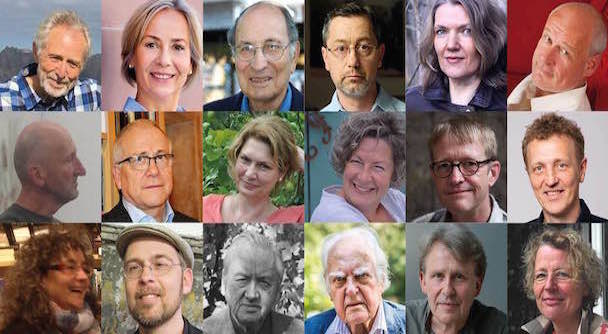Authors & Books
Dieter Frankenberg
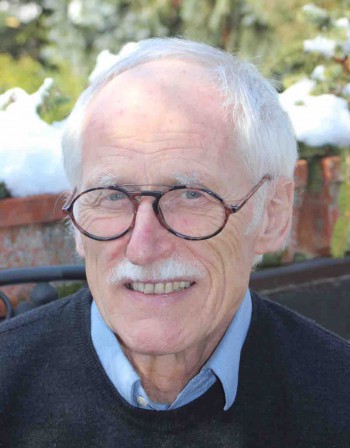
Dieter Frankenberg was born in Friedberg/Hessen in 1938. After his A-levels in 1958 he studied physics and habillitated in Frankfurt am Main. Since 1991 he is the head of the department of radiation biology and radiation physics at the university Göttingen.
Since his days at school he regularly visited the evening classes at the Frankfurter Städelschule. His teacher is Walter Hergenhahn, master pupil of Max Beckmann. He writes lyric since 1944.
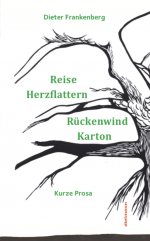
978-3-86638-382-1

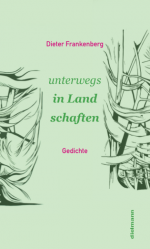
Unterwegs in Landschaften (Out in The Landscapes)
Poems
- Softcover
- 88 pages
978-3-86638-285-5

Dieter Frankenberg is travelling in landscapes—when he sits as a dfraftsman in the Pyrenees, or when he is cycling or hiking trough the central german area, as well as when he cuts pictures in wood in his workshop, just like when he sinks poems like plumb into his surrondings. The cord along he plumbs, connects every time the moment wiht the story and the individual impression with the lifelines, that cross his favourite places—and already we are ouselves travelling in landscapes, that open worlds with every verse.
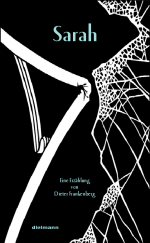
Sarah
Narrative
- 72 pages
- Swabian brochure
978-3-86638-929-8

A love story, which is peculiar because of bringing together its lovers out of conceivable utterly different social positions: he is a radical critic of the capital, she is the daughter from a luxurious speculative family; she is initially unhesitatingly on her way in an expensive roadster, he is about to go from system critical economics to consultant of a department for economic crime. - Does this and do they have a chance of a happy ending?
Previously published by Dieter Frankenberg: the book of poems »Der Profit« as well as his narratives in the volume »glitzerträume blau« with five narrators from Göttingen. Just as in all of his volumes, the graphics of this book are based on woodcuts by Dieter Frankenberg.
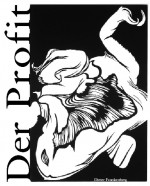
Der Profit
woodcarvings and poems
- 56 pages
- string bound by hand
- Der Profit contains 22 reproductions of woodcarvings by the author
- format of the original works between 30 cm x 45 cm and 45 cm x 60 cm
978-3-933974-20-4

Das Wort
Ein Sinn fand eine Hülse
und schlüpfte in sei hinein.
Einverstanden in Symbiose
lebten sie fortan zu zwei'n.
Ein Funktionär fand dies Gebilde
und verleibte es ich ein.
Missbraucht als Wortgehülse
ward es ein Teil von seinem Sein.
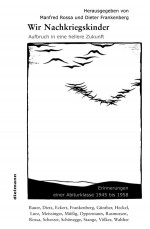
Wir Nachkriegskinder
In a bright future
memories of an A-level class
- 352 pages
- softcover with many pictures
- follow up volume to »Mein Kriegsende«
978-3-86638-152-0

An A-level class of 1958 remembers.
In 2005 a Frankfurter A-level class brought the book »Mein Kriegsende« (My end of war) forward – one of the first large documentations, how the children of that time experienced the transition from the experiences in the war to the years of peace. – Now the class of the now 70-year-olds continues their memories.
After a short review of the traces and influences of the first book, 19 reports of the childhood follow – the former pupils have divided their reports accordingto the zones of occupation, from where they came, and after the way of their escape, they took after the end of the war. Through this the volume draws the ways of the lives and suffering of the children in a historical-political, but also in their own emotional arrangement.
The aspect of transition from one society system to another, looking back through the point of view of young people, always plays a central role.
On top of an overview about the afterwar time in general, inriched by some feuilletonistic remarks, the school time after the war and the coming together of the class in the Bockenheimer Liebigschule, with a portrait of the class teacherDr. Fleckstein, is given. Five of the former peupils and their stories are also introduced through portraits form the FAZ »A class of its own« (Stange, Rossa, Völker, Frankenberg, Scherzer) – and some of their classmates show in their texts important themes and switch stands of their live.
Numerous unpublished photos make the second volume of the A-level class a document of time of a special forcefullness and denseness. – The untiering work of publisher Manfred Rossa, on the first volume together with Manfred Walther, now together with Dieter Frankenberg, had the goal, which is strengthend in the subtitle: to strengthen next to the oppressive past the future – »Nach Krieg und Not in eine hellere Zukunft« (after war and suffering to a brighter future)!
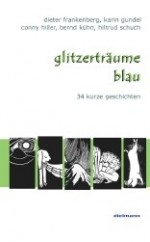
glitzerträume / blau
34 shortstories by five authors
- 184 pages
- with reproductions of 7 woodcarvings
978-3-86638-156-8

Once a month five authors meet. Then they discuss and proofread their texts, which they have written on a common theme like »the first time«, »the celebration« or »tailwind«. Characters are scrutinised, parts are cut out or a different ending has to be found. Sometimes they agree – sometimes they fight. That works since many years – maybe, because they dine together before hand.
Now there is this book with it’s 34 shortstories. About the delight of eating, about chance, how the fortune goes, about love and the morning after. Stories at the fair featuring shooting matches, in the forest at night or on Teneriffa. About the far reaching consequences of a run on a saturday afternoon and a christening without a priest. Stories about a gasman, who is ringing two times, a professorwith handcuffs and a rabbit in a hommock.
The selection reaches from the humoresque to the calssical shortstory. It tells sad, heart-warming, unpleasant, vicious, things. A reading for a quater of an hour – that will stick with you for years, for example when the misery of an abused child trough the tipping figure of a peeling her way to freedom narrator is decribed or the life of a farmhand is compressed on four pages filled with rural suffering and mockery. The prose draws a bow, abruptly condencing, from a tiny occurence with long lasting effects in the hearts of the protagonist to big historical themes.
The athors along Conny Hiller are: Karin Gundel, who originates from the south and now lives in a town filled with nobelprizewinners and unhappy people. Dieter Frankenberg, former physician, lyricist, fine artist, who has published two titles at us. Bernd Kühn is interested in psychoanalysis and, makes remarkable jams. Hiltrud Schuch lives and draws in a little frame house on an iland in Weserbergland. – all five have already published several anthologies.
Beginning of the novella »The stupid girl« by Conny Hiller:
One day I’ll catch you!“, he had written out of jest on the photo, that he had secretly taken of Jule.
Many weeks had passed since then, in which he did not dare talk to her. He simply sat there and listend. He looked at her, how she laughed, how she drank, how she made bubblegum bubbles. He looked at how she bit her nails, how she walked away with strange boys and how she came back.
Today was the first time he had gone to the busstop obverse the fire service again. Nobody had noticed that he had not as usual gone there after dinner, noone seemed to have registered his absence. He was the golden retriever of the youth in the village. He was liked, he did not distract, but if he did not show, nobody noticed.
Suddenly Jule looked at him and smiled.
This night he lay under his covers with a hugh cushion under his arm and he did not know if he should laugh or cry. His thoughts clinshed Jule’s smile. He wanted to have it to himself, for ever and always.
On the way to the busstop he had tried to hide his feelings. He walked along the Heinemanns and spoke with grandfather Alfred. When he arrived at the meeting point, it was as always. Jule looked right through him. Everyone stood around Kadir, who had shot himself up to the goalgetter-king of the »Kreisliga« and he wanted to celebrate.
Never had he cursed himself as much. Never had he long this much to be tall and strong, to be cool. And never had he experienced such an emptyness in his head.He could not explain later, how he had managed to say to Jule:
„You are going to the Oktoberfest with me! I will pick you up saturday at six.“
She had only looked at him with her big eyes and dipped her red lolly in the plastic cup with vodka. ..
And the story: »A saturday afternoon« by Dieter Frankenberg:
Version:1.0 StartHTML:0000000183 EndHTML:0000010543 StartFragment:0000003984 EndFragment:0000010507 SourceURL:file:///Users/adv/Desktop/Lisann/Verlagsseite%20auf%20Englisch.doc
A saturday afternoon
„You have a run.“
Sabine moved her head, but saw nothing.
„Where is it?“
„Above the hollow of the knee. On the right.“
Klaus brought a mirror from the bathroom.
„It is still very short. Nobody will see it during shopping. –
Bye then.“
Klaus was on flatduty: vacuuming, wiping, dusting. After three hours of intensive work he poured himself a cognac. Fianlly weekend. He and Sabine would go out for dinner tonight. He was looking forward to it.
He reached for the magazine of the weekly newspaper. Butthe articles boared him. – where was she? The shopping list had been short, only a few fresh things. The farmers’ market was with the car in five minutes reache.
„Hallo, I am back.“
„Did the cow had to be milked first?“, teased Klaus.
„Yes! I am out of training in milking. No, nonsense. I have finally met Inge again.
Klaus stood in the kitchendoor. Sabine took off her jacket and put it on a hanger. The run of her tights reached from the hollow of her knee to the edge of her minidress.
Sabine took the shoppingbasket, which she had put down next to the coat rack, and turned. She came near him. His heart stalled.
„Klaus, don’t make yourself so large in the doorway. I can’t pass you – what is wron? Somehow you are not even here.“
Sabine put the handle of the shopping basket in Klaus’ hand. She fell in one of the armchairs.
„You have been away for a long time. I already thought you had gone to the swimmingpool or tried somehting on.“
„I did not have any swimmingattire with me. Besides I would have told you. And I coud not be bothered to try something on today.“
„Are you wearing your tights sometimes around the left?“
„Yes, if I am in a hurry. – Klaus, what is the matter! So far you have never noticed that I am wearing tights from time to time around the wrong side. It does not matter if right or left.“
„Your run has enlarged.“
Sabine stood up and looked at her right leg:
„I don’t see anything.“
„Above the hollow of the knee.“
Klaus moved Sabine in front of the mirror at the coat rag.
„I don’t see anything at the right leg.What a bunch of nonsense. I can not stand to hear about a run anymore.“
„I believe you. Maybe you should look at run on your left leg!“
„Klaus, are you mad?“
„You don’t want to look at your run?“
„No! I did not know that you could get off on such little things.“
„Oh yes! Little things that change lives.“
„A run?“
„No. But a run, that magically changed from rheg right to the left leg.“
Sabine starred at Klaus. She stood there like a pillar of salt.






